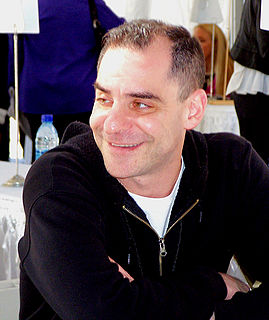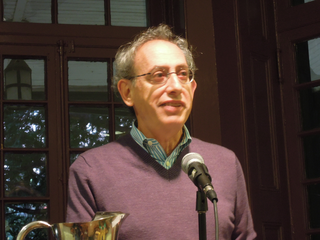A Quote by David Rakoff
I have let half-decades elapse between books because books have to be writte and writing is awful, but if you are the type of person who makes things, there is no profit in worrying about how or why or when the next project will come into being beyond simply acknowledging that it is inevitable that it will be very soon.
Related Quotes
The current publishing scene is extremely good for the big, popular books. They sell them brilliantly, market them and all that. It is not good for the little books. And really valuable books have been allowed to go out of print. In the old days, the publishers knew that these difficult books, the books that appeal only to a minority, were very productive in the long run. Because they're probably the books that will be read in the next generation.
The iPod is clearly a tipping point (and I'm not quite sure it is a wholly positive development), because it is a revolution in the way that we consume creative property, which I would call art. It has radically changed the relationship between the artist and the audience, how money changes hands, and how much money changes hands. Music was the first, and books are coming next. The Kindle or some form of electronic book is clearly inevitable, and it will massively reshape how books are sold, who pays for them, and how they're consumed. It is going to be really fascinating.
I write books because I have always been fascinated by stories and language, and because I love thinking about what makes people tick. Writing a story... 'The Giver' or any other... is simply an exploration of the nature of behavior: why people do what they do, how it affects others, how we change and grow, and what decisions we make along the way.
A man's bookcase will tell you everything you'll ever need to know about him," my father had told me more than once. "A businessman has business books and a dream has novels and books of poetry. Most women like reading about love, and a true revolutionary will have books about the minutiae of overthrowing the oppressor. A person with no books is inconsequential in a modern setting, but a peasant that reads is a prince in waiting.
How do you remember everything from different books when you are still writing the HP series? As obsessive fans will tell you, I do slip up! Several classrooms move floors mysteriously between books and these are the least serious continuity errors! Most of the fansites will point you in the direction of my mistakes. But the essentials remain consistent from book to book because the story has been plotted for a long time and it is clear in my mind.
I try to just be open to what the next experience is and how it makes me feel, just reading a project, or trying to get involved with a project, or thinking about a project, and what particular emotional flavor that brings. To me, it's never really about planning the next thing, or the career arc. It's about investigating how I feel, from project to project, and finding things that I haven't explored and what that would be like.
As a rule, I am very skeptical of tying books to anniversaries. I don't think readers care. I also feel that it just about guarantees that somebody else will be writing a book on the same subject, but being a former journalist, I'm always interested in, like, why write about something today? Why do it now?
They will be given as gifts; books that are especially pretty or visual will be bought as hard copies; books that are collectible will continue to be collected; people with lots of bookshelves will keep stocking them; and anyone who likes to make notes in books will keep buying books with margins to fill.
Memento mori - remember death! These are important words. If we kept in mind that we will soon inevitably die, our lives would be completely different. If a person knows that he will die in a half hour, he certainly will not bother doing trivial, stupid, or, especially, bad things during this half hour. Perhaps you have half a century before you die-what makes this any different from a half hour?
It takes me about a week and a half to read the typical book. I don't know how many ten-day spans I have left. Eventually the unread books on my shelves will have to be abandoned, or they will join me on the pyre. The book I'm about to purchase may be among them. We all buy books we won't live to read.
If you are reading in order to become a better reader, you cannot read just any book or article. You will not improve as a reader if all you read are books that are well within your capacity. You must tackle books that are beyond you, or, as we have said, books that are over your head. Only books of that sort will make you stretch your mind. And unless you stretch, you will not learn.
[He Stopped Loving Her Today] is all about the experience of being alive and the thought process of consciousness, and then you have these polemical essay-type things going on for a couple decades now. Some of these music books are where you're going to see an anecdote of a person behaving without some kind of commentary.





































